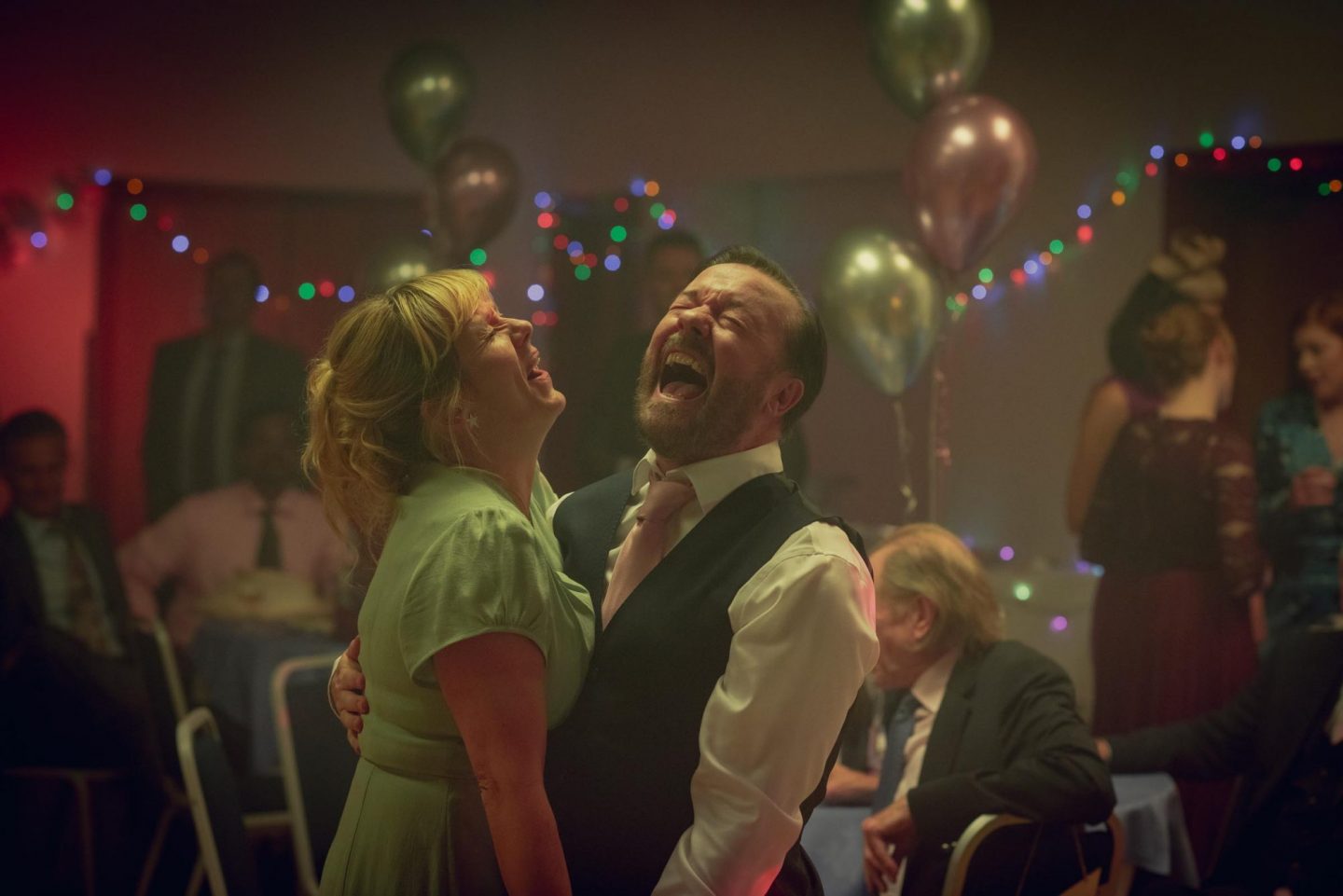Review:
After Life

Ricky Gervais’ latest Netflix series returns, and this time the supporting players are threatening to take over and there’s even a whiff of sentimentality. But, nevertheless, he’s just as Gervais-esque as ever.
Creator, executive producer, writer, director and star Ricky really found a character here that matches his grumpily truth-telling, no-shits-given public persona, but his Tony is now struggling to be a better, kinder person in spite of the continuing profundity of his grief and pain. And he’s having a foul-mouthed hell of a time.
And please note that there are certain spoilers here for the first series (or ‘season’ if you’re in America) of After Life, so don’t say we didn’t warn you.
Tony is again introduced watching old laptop movies of his late wife Lisa (Kerry Godliman, also in Gervais’ Netflix series Derek) and wearily beginning his day by feeding his gorgeous German shepherd Brandy as no less than The Carpenters’ Top Of The World plays somewhat sarcastically on the soundtrack. Reassuring everyone that he no longer wants to kill himself and trying hard not to harshly cut down those around him, Tony still works at the free Tambury Gazette paper, still has to deal with a veritable menagerie of types who swirl around him, and still finds himself drawn to nurse Emma (Ashley Jensen), who tends to his wandering-in-his-wits father Ray (the redoubtable David Bradley).
New subplots crop up, with Tony’s brother-in-law and boss Matt (sweet Tom Basden) quietly falling apart as he separates from his wife Jill (Laura Patch), camp-as-a-row-of-tents Ken Otley (Colin Hoult) turning up as the head of a local amateur dramatics company, and Gazette owner Paul (Peter Egan) appearing in several episodes as the inevitable happens (and no spoilers necessary).
And there are so many other characters too, including: Tony’s colleagues at the paper, notably dim but loyal photographer Lenny (Tony Way), idealistic journo Sandy (Mandeep Dhillon) and seemingly tough advertising exec Kath (Diane Morgan, a.k.a. ‘Philomena Cunk’ from Charlie Brooker’s smallscreen outings); hapless ‘Postman Pat’ (Joe Wilkinson), whom Tony sets up with philosophical sex worker Daphne/‘Roxy’ (Roisin Conaty); and, again, elderly widow Anne, once more portrayed by ‘National Treasure’ Penelope Wilton and mostly seen sitting on a bench in the local graveyard. There was a small school of thought that wondered if her disconnection from the main plot and action meant that she was a figment of Tony’s imagination or even some sort of wise ghost, but she is eventually allowed to actually stand up and interact with others here, which is lovely.
Andy Burrows’ music almost gets a bit much, at times, with tinkly piano riffs underscoring major emotional moments, but Gervais compensates by including fitting tunes from a selection of popsters who were surely glad to be included, with Billy Joel and Lionel Richie numbers featuring alongside Can You Hear Me? by the dear departed David Bowie, whom Ricky famously grew close to after he appeared oh-so-fabulously in Gervais’ Extras.
However, unlike, say, Netflix’s Orange Is The New Black, where the ostensible protagonist’s arc was soon overwhelmed by a deep supporting cast, Tony still remains the focus, despite several scenes in which he doesn’t appear (such as Pat and Roxy’s beautifully-played first date). And he’s still the one that grapples with the weightiest, thorniest, most scarily existentialist themes, with big, ominous questions looming and, perhaps, never properly answered. Just like life.
How do you ‘move on’? What constitutes a ‘good person’? How do we deal with or somehow get past grief, guilt and pain – or can we ever? Is there anything that can possibly distract us from the terrible certainty of death? And how do we actually do that ever-elusive ‘right thing’ ™? And, as Tony would say, what the f*** even is the ‘right thing’ ™ these troubled days?